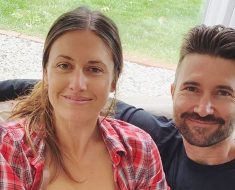By AnnaMarie Houlis
Science says happier people are raised by parents who do this one thing, according to Jeff Haden. But I need to ask: What if the parent has no idea how to properly execute this thing?
According to a study from the University College London, people who perceived their parents as less psychologically controlling and more caring as they were growing up were likely to be happier and more satisfied adults. I get that. I can see the huge advantages of having a solid, caring and warm foundation versus the mind games and emotional blackmail tactics usually employed by parents of yore and perhaps even now. Only a mother knows how to instill gnawing guilt and a father’s disapproval can crush even the most accomplished adult.
More: These Childless Women Are Happy — So Why Won’t Anyone Believe Them?
That being said, if we the parents are the products of overcontrolling parents, how can we be expected to raise happy adult-children? Would we even know how? Children learn what they live, and I, like many, learned the direct opposite of a caring and warm environment.
So, being an avid believer in modeling behavior, I decided I needed to learn how to be happy. This seemed a rather odd goal because I didn’t consider myself to be unhappy, but I wasn’t necessarily happy. Sure, things were good, but I always found myself pressed for time, worried about something or rushing to do everything. My responsibilities as a mom, wife and worker always seemed to get in the way of just being happy, or more important, I let those things get in the way of my happiness.
The takeaway is that the No. 1 most important thing any parent can do to nurture their child’s happiness, contentment and confidence as an adult is to show them not only how to do all those things, but what it looks like.
So, what does happy look like? Do you know? Are you modeling happy? If you asked your children right now, “Do you think mommy and/or daddy is happy?” you would be shocked at their answers.
Younger children tend to say their parents are happy most of the time with the exceptions of: when their parents get home from work, are stuck in traffic, paying bills, shopping, getting the car fixed, fighting about money, etc.
Adolescents on the other hand will say their parents are never happy. “They’re always stressed out. They’re miserable because they’re broke all the time. They hate their jobs. They never laugh. They have no idea how to have fun. They don’t even smile.”
More: 3 Women with Nontraditional Family Dynamics Show How Communal Care Works for Them
Talk about a reality check. How do you think your children would grade you on the happiness scale?
Think about it. Our children usually don’t do what we tell them to do, but they always do as we do, even when they say, "I will never say that to my child," or "I will never do that with my children." I would wager big money that in 10 to 15 years, they will be doing and saying the exact same things they swore they would never do or say. And this is why it is so important to make your happiness as the parent your No. 1 priority.
Taking care of yourself — your physical, mental and spiritual well-being — is paramount to teaching your children how to value themselves. They need to see you tend to your own happiness so they will know it’s OK to take time for themselves, to do whatever it is that makes them feel recharged, refreshed and happy with how they show up in the world, and more important, to those who matter most.
More: This Mom’s Viral Post About Front-Load Washing Machines Is a Warning to All Parents
In a nutshell, your child’s adulthood happiness depends on your happiness right now. The happier you are, the more energy and ease you will have to literally swaddle your child in warmth and caring.
Originally published on Fairygodboss.
Source: Read Full Article





